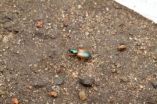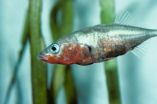(Press-News.org) CHICAGO – Patients hospitalized after a heart attack who had blood potassium levels of between 3.5 and less than 4.5 mEq/L (milliEquivalents per liter) had a lower risk of death than patients with potassium levels that were higher or lower than this range, according to a study in the January 11 issue of JAMA. Clinical practice guidelines recommend maintaining serum potassium levels between 4.0 and 5.0 mEq/L in patients after a heart attack.
"Potassium homeostasis [equilibrium] is critical to prevent adverse events in patients with cardiovascular disease. Several studies have demonstrated a relationship between low serum potassium levels, usually less than 3.5 mEq/L, and the risk of ventricular arrhythmias in patients with acute myocardial infarction [AMI; heart attack]. On the basis of these studies, experts and professional societies have recommended maintaining potassium levels between 4.0 and 5.0 mEq/L, or even 4.5 to 5.5 mEq/L, in AMI patients. However, most prior studies were conducted before the routine use of beta-blockers, reperfusion therapy, and early invasive management in eligible patients with AMI," according to background information in the article. In addition, these studies were small. "Therefore, there is a lack of current, adequately powered studies that define the optimal range of serum potassium levels with respect to mortality and other important clinical outcomes in patients with AMI."
Abhinav Goyal, M.D., M.H.S., of the Emory Rollins School of Public Health, Atlanta, and colleagues conducted a study to determine the relationship between serum potassium levels and in-hospital mortality in AMI patients in the era of beta-blocker and reperfusion therapy. The study included 38,689 patients with biomarker-confirmed AMI, admitted to 67 U.S. hospitals between January 2000 and December 2008. All patients had in-hospital serum potassium measurements and were categorized by average postadmission serum potassium level.
Of the study patients, 2,679 (6.9 percent) died during hospitalization. The researchers found that compared with the reference group (3.5- END
Study evaluates blood potassium levels after heart attack and risk of in-hospital mortality
2012-01-11
ELSE PRESS RELEASES FROM THIS DATE:
VLBA, RXTE team up to pinpoint black hole's outburst
2012-01-11
Astronomers have gained an important clue about a ubiquitous cosmic process by pinpointing the exact moment when gigantic "bullets" of fast-moving material were launched from the region surrounding a black hole. They made this breakthrough by using the ultra-sharp radio "vision" of the National Science Foundation's Very Long Baseline Array (VLBA), along with NASA's Rossi X-ray Timing Explorer (RXTE) satellite, to study an outburst from a system including a black hole and its companion star in 2009.
Black holes in such binary-star systems can pull material from their companions. ...
People with dementia have more preventable hospitalizations
2012-01-11
SEATTLE–Compared to individuals without dementia, people who subsequently developed dementia had a significantly higher rate of hospital admissions for all causes. They also had more admissions for "ambulatory care-sensitive" conditions, for which proactive care may have prevented hospitalizations. This suggests opportunities for improving outpatient care of seniors with dementia, according to research in the January 11 Journal of the American Medical Association.
"Nonelective hospitalization of older people, particularly those with dementia, is not a trivial event," ...
Global study sheds light on role of exercise, cars and televisions on the risk of heart attacks
2012-01-11
A worldwide study has shown that physical activity during work and leisure time significantly lowers the risk of heart attacks in both developed and developing countries. Ownership of a car and a television was linked to an increased risk of heart attacks, particularly in low- and middle-income countries.
The findings come from the INTERHEART study, a case-control study of over 29,000 people from 262 centres in 52 countries in Asia, Europe, the Middle East, Africa, Australia, North and South America. It is published online today (Wednesday) in the European Heart Journal ...
Predators hunt for a balanced diet
2012-01-11
An international team of scientists from the Universities of Exeter and Oxford in the UK, University of Sydney (Australia), Aarhus University (Denmark) and Massey University (New Zealand) based their research on the ground beetle, Anchomenus dorsalis, a well-known garden insect that feasts on slugs, aphids, moths, beetle larvae and ants.
The team collected female beetles from the wild and split them into two groups in the laboratory. Half of the beetles were offered a choice of foods, some that were high in protein and some that were high in fat. The other half were not ...
Smokers 'salivate' to cigarettes: The physiological reactions to associated images
2012-01-11
It is commonly known that, much like Pavlov's dogs salivating in response to hearing the bell they associate with dinner time, smokers feel cravings and have physiological reactions to pictures they associate with smoking. New research published in BioMed Central's open access journal BMC Neuroscience has shown that a smoker's cravings can also be trained to non-smoking related stimuli.
Classical conditioning experiments link a neutral stimulus, such as a sound or a picture, to an event, like eating or smoking. Higher order, sometimes called second order conditioning, ...
New educational program helps the siblings of children with cancer
2012-01-11
Having a brother or sister with newly diagnosed cancer can be a distressing and difficult time for a child. While most children eventually cope, there can be a period of adjustment when their school work and social functioning suffer. New research published in BioMed Central's open access journal Child and Adolescent Psychiatry and Mental Health shows that a teaching program, designed to improve the child's knowledge about their sibling's disease and to give them coping skills, was able to improve their adjustment and psychological well being in this early time period after ...
Surgeons aged between 35 and 50 provide the safest care
2012-01-11
Surgeons aged between 35 and 50 years provide the safest care compared with their younger or older colleagues, finds a study published on bmj.com today.
The findings raise concerns about ongoing training and motivation of surgeons during their careers.
Typically, experts reach their peak performance between the ages of 30 and 50 years or after about 10 years' experience in their specialty, but few studies have measured the association between clinicians' experience and performance.
So a team, led by Drs Antoine Duclos and Jean-Christophe Lifante from the University ...
New UK Finance Website Provides Short Term Loans - Paydayloansuk.org.uk
2012-01-11
With Christmas over for another year and many people feeling the pinch after overspending, it seems that the solution to their problems will be a little short term financial help. A new company called Paydayloansuk.org.uk has been set up and could help people in this sector to get themselves back on track in the short term.
This provider has been set up to give customers financial help quicker than a lot of other companies. By taking customers needs and details quickly, they can help them out without delay. In most straightforward scenarios, money can be available to ...
Gut hormone leads to weight loss in overweight or obese patients
2012-01-11
Giving overweight or obese patients a gut hormone that suppresses appetite leads to clinically beneficial weight loss as well as reduced blood pressure and cholesterol levels, finds a study published on bmj.com today.
Glucagon-like peptide-1 (GLP-1) is a hormone that is secreted from the intestine when we eat. GLP-1 based therapy was recently introduced as a new treatment for patients with type 2 diabetes because of its ability to regulate blood sugar levels.
But it also suppresses food intake and appetite, making it an interesting approach in the treatment of obesity. ...
Diseases and sex
2012-01-11
The great variation of a specific form of immune genes makes organ transplants so complicated. On the other hand, we need such a great variability in order to resist infectious diseases. This is why it also plays a major role in the selection of sexual partners. Up until now, the mechanisms for maintaining this standing genetic variation have remained an evolutionary puzzle. In a study of sticklebacks, researchers from the Max Planck Institute for Evolutionary Biology in Plön, together with colleagues from the Helmholtz Center for Marine Research in Kiel, have now shown ...


